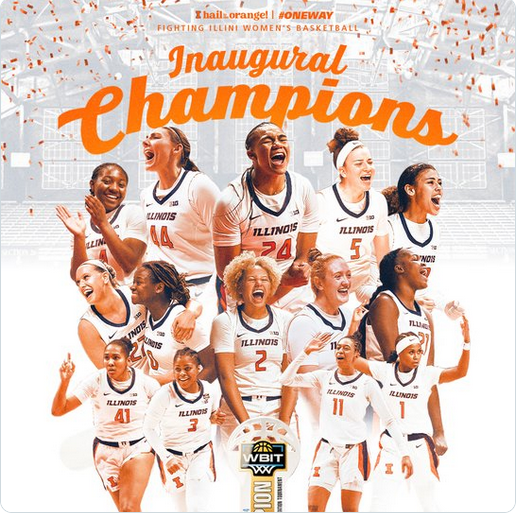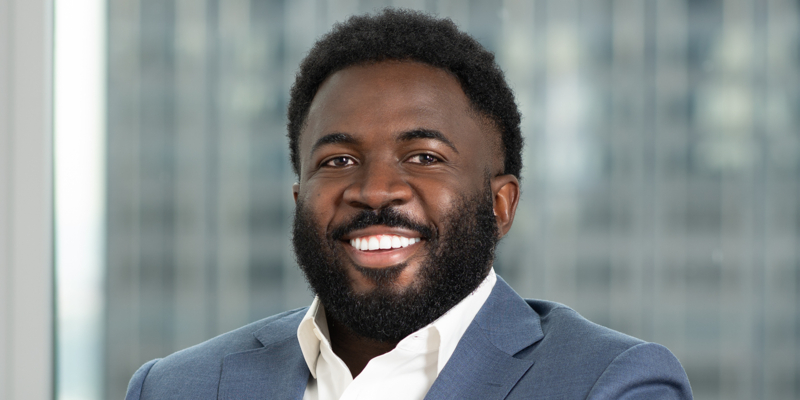Alumni Attorney Talks is a virtual series that aims to provide prospective law students with helpful insights about attending law school and pursuing a legal career. This series features interviews with University of Illinois alumni working in a variety of diverse settings within the legal profession.
In honor of an exciting March Madness tournament season, please enjoy this special edition of Alumni Attorney Talks featuring a look at Sports Law!
Congratulations to our Illini Women’s Basketball team for their WBIT National Championship win, the Illini Men’s Basketball team on their Big 10 Championship and NCAA Tournament Elite Eight appearance, and all other Illini athletes on their 2023-2024 seasons!
Quentin Ayukesong
ASSOCIATE, LATHAM & WATKINS
QUICK FACTS ABOUT MR. AYUKESONG
- Law School: Washington University School of Law
- Mr. Ayukesong’s Two Words to Describe the Legal Profession:
Complex | Enriching
What is Sports & Entertainment Law?
Sports & entertainment (S&E) law is characterized chiefly by the representation of peoples and organizations within the entertainment and sports field. Clients may include actors, athletes, entertainers, and sports or media organizations. An S&E attorney may represent their client in matters such as commercial transactions, intellectual property, contract negotiations, or merchandising agreements. S&E attorneys tend to focus on matters of business and IP, but they often have to be jack-of-all-trades based upon their client’s needs. Mr. Ayukesong works on mergers & acquisitions and private equity deals within the Sports & Entertainment industry.
CHECK OUT THIS INSIGHTFUL INTERVIEW BELOW!
Mr. Ayukesong’s Background
Answer:
Quentin Ayukesong is currently an associate at Latham & Watkins LLP. He advises public and private companies, private equity funds, and investors on a wide range of matters in entertainment, sports, and media, technology, retail and consumer, and hospitality, gaming, and leisure industries. industries. Prior to joining Latham & Watkins, he practiced law at another major US law firm in New York, and worked for several prominent sports and entertainment organizations, such as the National Basketball Association (NBA), the Brooklyn Nets, CBS Sports, the Big Ten Network, and Excel Sports Management. Mr. Ayukesong received his bachelor’s degree from the University of Illinois in 2013. He then went on to earn a M.S. from Columbia University in 2016 and a J.D. from Washington University School of Law in 2019.
What types of issues do mergers and acquisitions (M&A)/private equity attorneys see in the entertainment, sports, and media industries?
Answer:
M&A/private equity attorneys in entertainment, sports and media encounter a diverse array of legal issues that reflect the dynamic nature of these industries. Generally, in the realm of M&A, we often deal with the negotiation and drafting of purchase agreements, the process of due diligence to uncover any potential liabilities or risks associated with acquiring a company, and the navigation of complex regulatory environments that can include antitrust considerations and intellectual property rights.
Specifically, in the media and entertainment sector, M&A transactions frequently involve the valuation and transfer of intellectual property assets, such as film libraries, music catalogs, and television franchises. Ensuring that these assets are properly valued and that their rights are clearly defined and protected is crucial.
In sports, M&A activities can include the sale or purchase of sports teams, the negotiation of media rights, and the development of sports facilities. These transactions require a deep understanding of league rules, collective bargaining agreements, and the unique revenue streams associated with sports franchises, such as sponsorship deals and broadcasting contracts.
Private equity practices within these sectors often involve the acquisition of stakes in entertainment and sports properties or companies. Legal issues here can include structuring investments to comply with industry-specific regulations, while managing relationships with existing stakeholders.
Overall, M&A attorneys in sports and entertainment must be adept at managing a variety of legal and business challenges, ensuring compliance with a complex web of regulations, and protecting the interests of their clients in a landscape that is constantly evolving due to technological advances, shifting consumer behaviors, and the introduction of institutional capital and acquisition opportunities across leagues.
You currently work at a big law firm. What are some other types of settings sports & entertainment attorneys may work?
Answer:
Sports and entertainment attorneys have the opportunity to work in a variety of settings beyond the traditional big law firm environment. These settings can range from in-house legal departments at major sports leagues, universities, sports agencies and media companies. Additionally, nonprofit organizations, including sports foundations, arts councils, and advocacy groups, also employ attorneys to help navigate legal issues related to their missions, such as protecting artists’ rights or promoting access to sports programs (shoutout to Volunteer Lawyers for the Arts and Latham’s ongoing partnership with them!)
What are some experiences/activities you would recommend undergraduate students get involved in if they are interested in law school? What about experiences for students particularly drawn to sports and entertainment?
Answer:
For undergraduate students interested in pursuing law school, I recommend engaging in a variety of experiences and activities that will strengthen their law school applications and also provide a solid foundation for their future legal careers. The most crucial thing is to focus on academic excellence. Next, I would aim to develop strong writing and research skills by taking courses that require substantial writing. I would join school clubs, seek internships, and engage in volunteer work. Finally, when it comes to those particularly drawn to sports and entertainment, I would network, network, and network.
What is your favorite part about being an attorney?
Answer:
Good question. First, my favorite part about being an attorney is knowing and appreciating the journey it took to get here. From a young age, I had an idea that I wanted to be an attorney, but I didn’t fully comprehend the effort required to accomplish this goal. It took years of learning, failures, and grit to become an attorney. I’m grateful for every experience and for every person that guided me.
Second, one of the most rewarding aspects of my career as an attorney is the opportunity to advocate for my pro bono clients. I’m deeply passionate about ensuring that their voices are heard, their rights are protected, and their creative visions and professional goals are advanced through my legal support.
Do you have a recent deal highlight that you’re most proud of?
Answer:
Yes, advising two limited partners in the consortium that recently acquired the National Football League’s (NFL) Washington Commanders for US$6.05 billion.
Anything else you would like to add?
Answer:
Through life’s endeavors, it’s always important to maintain gratitude. I wouldn’t be here without my family and, certainly, without my board of mentors: James C. Johnson, Steve Horowitz, Seth Krauss, Mitch Kupchak, Gary Sacks, Alex Moyer, Joseph Brazil, Frank Lupinacci, Justin Hamill and Christopher Cross. Each one of them has taught me the importance of working hard, treating people well, and paying it forward.


